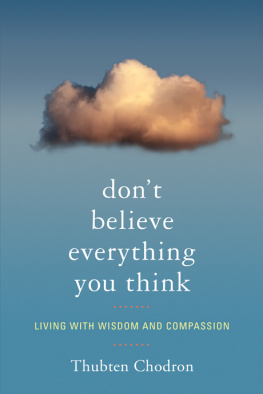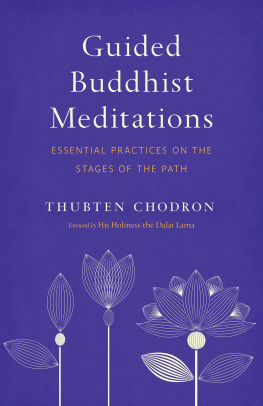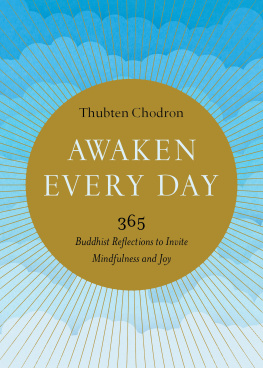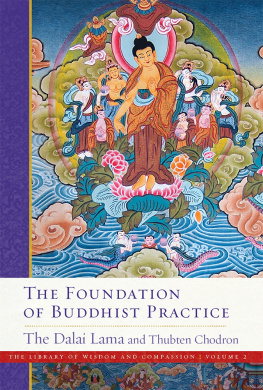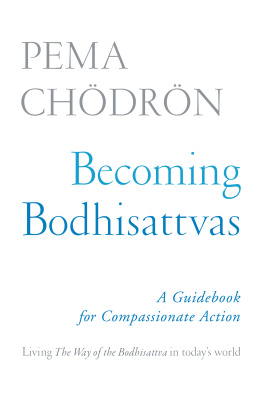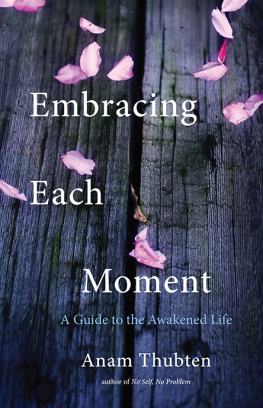Reading this book will help you become a better, happier person. In it we find a masterpiece of Tibetan spirituality illuminated by the contemporary experiences of people from all walks of life. Venerable Thubten Chodrons clear voice links the challenges of our ordinary lives to the deep insights of the Buddhist mind-training tradition. If you are seeking the Dharma, she is a reliable guide.
Guy Newland, author of Introduction to Emptiness
A must-read for aspiring bodhisattvas.
Tenzin Palmo, author of Reflections on a Mountain Lake
Ven. Thubten Chodron has the extraordinary ability to present even the most spiritual teachings simply and directly, in way that impact our everyday lives.
Jonathan Landaw, author of Images of Enlightenment
ABOUT THE BOOK
It can be hard for those of us living in the twenty-first century to see how fourteenth-century Buddhist teachings still apply. When youre trying to figure out which cell phone plan to buy or brooding about something someone wrote about you on Facebook, lines like While the enemy of your own anger is unsubdued, though you conquer external foes, they will only increase can seem a little obscure.
Thubten Chodrons illuminating explication of Togmay Zangpos revered text, The Thirty-seven Practices of Bodhisattvas, doesnt just explain its profound meaning; in dozens of passages she lets her students and colleagues share first-person stories of the ways that its teachings have changed their lives. Some bear witness to dramatic transformationsmaking friends with an enemy prisoner-of-war, finding peace after the murder of a loved onewhile others tell of smaller lessons, like waiting for something to happen or coping with a minor injury.
THUBTEN CHODRON, an American-born Tibetan Buddhist nun, travels worldwide, teaching and leading meditation retreats. Known for her clear and practical explanations of the Buddha's teachings, she is the author of Buddhism for Beginners; Working with Anger; How to Free Your Mind; Open Heart, Clear Mind; and Taming the Mind. She lives in Seattle, Washington.
Sign up to receive inspirational Tibetan Dharma quotes and special offers from Shambhala Publications.

Or visit us online to sign up at shambhala.com/edharmaquotes.
Dont Believe Everything You Think
Living with Wisdom and Compassion

Bhikshuni Thubten Chodron
SNOW LION
BOSTON & LONDON
2012
Snow Lion
An imprint of Shambhala Publications, Inc.
Horticultural Hall
300 Massachusetts Avenue
Boston, Massachusetts 02115
www.shambhala.com
2012 by Thubten Chodron
Cover photo: Single Cloud by Eydis Einarsdottir/Glasshouse Images
All rights reserved. No part of this book may be reproduced in any form or by any means, electronic or mechanical, including photocopying, recording, or by any information storage and retrieval system, without permission in writing from the publisher.
Library of Congress Cataloging-in-Publication Data
Thubten Chodron, 1950
Dont believe everything you think: living with wisdom and compassion / Bhikshuni Thubten Chodron.
pages cm
Includes bibliographical references.
eISBN 978-0-8348-2838-4
ISBN 978-1-55939-396-6 (alk. paper)
1. Rgyal-sras Thogs-med Bza-po-dpal, 12951369. Rgyal-sras lag len so bdun ma.
2. Enlightenment (Buddhism)Requisites. 3. Spiritual lifeBuddhism.
I. Rgyal-sras Thogs-med Bza-po-dpal, 12951369. Rgyal-sras lag len so bdun ma.
English. II. Title.
BQ4399.T495 2012
94.3420423dc23
2012012415
Table of Contents


I AM GRATEFUL to the Buddha for teaching the Dharmathe path that ends all dukkha (unsatisfactory conditions)and I am also grateful to all those who learned, practiced, and passed on these wonderful teachings to this present day. One of those people was Bodhisattva (Gyelsay) Togmay Zangpo, who composed The Thirty-seven Practices of Bodhisattvas, the root text on which this book is based. My gratitude and respect go to His Holiness the Dalai Lama and Khensur Jampa Tegchok Rinpoche for their kindness in teaching this text to me. I had the privilege of editing Khensur Jampa Tegchoks commentary on this text, which was published as Transforming Adversity into Joy and Courage, and I recommend this book to you as a more in-depth explanation of these verses. Geshe Sonam Rinchen, another of my teachers, also wrote a book about The Thirty-seven Practices of Bodhisattvas, which was translated into English by Ruth Sonam, who also translated the root verses as they appear here in this book. In a few places, I have replaced her translation of terms with alternative translations.
I have often used The Thirty-seven Practices of Bodhisattvas as the root text for Dharma talks. After the talks I gave in 2005 at a short course at Sravasti Abbey were transcribed, Esther Thien edited them with the help of Jo Simpson and Karri McKee. To illustrate the practical application of these teachings in our daily lives, I added the true stories that Dharma students recounted about applying these verses to their lives. One day we sat around the dining room table telling our personal stories, laughing and crying at how silly and how sad our thoughts and lives become when disturbing emotions run the show. Other people later contributed more stories from their own experiences. While the names of the authors and people and some minor details in the stories have been changed, all these tales are true. We can learn so much by sharing our experiences of making the Dharma applicable to our lives. As you read each verse in The Thirty-seven Practices of Bodhisattvas, contemplate its meaning and make some examples of how you could implement it in your life.
All errors are my own. I am trying to practice the teachings in this book; we are all on this path together. My hope is that you enjoy and benefit from this book and that it enhances the meaning and quality of your life and lives.

I F SOMEONE told you to speak of the good qualities of a person who has broadcast all sorts of critical remarks about you in your workplace, you would probably tell them they were crazy. That person deserves not our praise but our blame, and were entitled to get even. In fact, we should get evenit will teach that person a lesson and make sure he doesnt do it again, at least not to us. Besides, we believe, saying a few choice scathing remarks behind that persons back will make us feel better.
Or so we think.
But dont believe everything you think because, believe it or not, it is often wrong. Even if all of our friends think its a good way to think, when we examine our own experience, well often discover that in fact that way of thinking makes us more unhappy. For example, a friend of mine is a public defender in federal court. She has attended at least twelve executions of men who have been tried and convicted of murder. During the trial and sentencing, the victims family firmly believes that executing the murderer of their loved one will alleviate their grief. But my friend told me that never once has she seen that happen. After the execution, people remain angry and bitter. What they thought would bring them relief from their suffering failed miserably.
Next page
